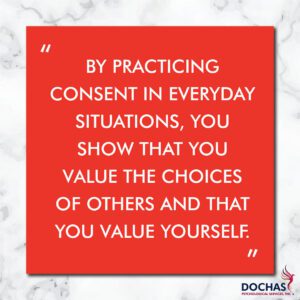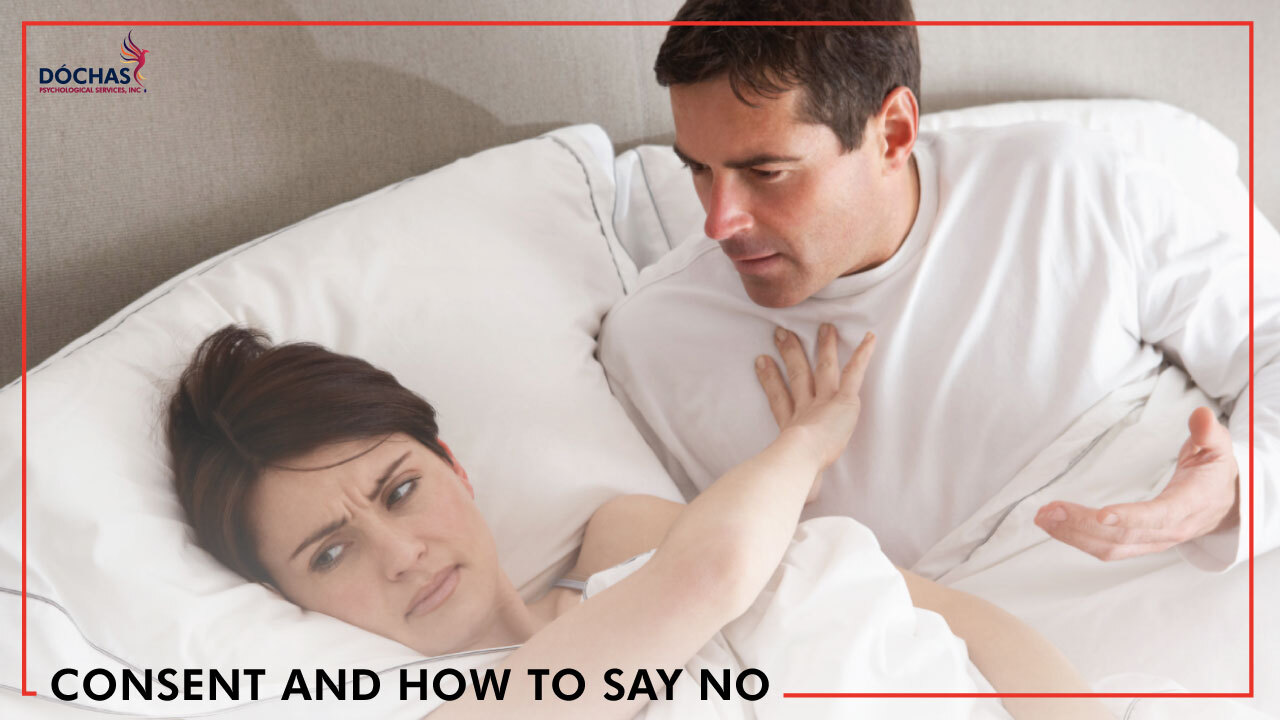Hello! It’s Schareen and Kassandra here again on the blog. Consent and the importance of saying “no” go hand-in-hand. You’ve probably heard a lot about these two concepts lately, but today we are going to dive into them a little deeper.
What is Consent?
First, let’s define consent. Consent is when one person agrees to or gives permission to another person to do something.
The first thing many of us think about when talking about consent is sex, but consent actually applies in many aspects of our everyday life. If you ask someone if they would like help putting their groceries away and they say “no,” then you do not have the consent to help them. Or if you would like to hug someone, it’s important to ask for their consent (using words like, “Can I give you a hug?”) before you dive in.
Consent is about always choosing to respect the personal and emotional boundaries of another person. By practicing consent in everyday situations, you show that you value the choices of others and that you value yourself.
Another important concept is “informed consent,” and this means that you are able to understand all the risks and benefits of what you’re agreeing to. You need to be able to understand what the consequences of your “yes” are!
We’ve talked about boundaries a lot on this blog before, but it’s important to connect these with the concept of consent as well—after all, if we do not know what our boundaries are, we will be less aware of what we feel comfortable saying “yes” or “no” to!

What are boundaries?
Boundaries are the limits and rules we set for ourselves within relationships. These relationships can be of any kind, such as friendships, or parent-child relationships. And the limits we set in these relationships can include physical, spiritual, and emotional boundaries.
One boundary might be asking a person to ask you first before touching your body (with a hug, kiss, handshake, or some other touch).
When you have a clear picture of what your boundaries are, then you get a clear picture of what you are okay to consent to or not.
Gender and Consent
Another important thing to emphasize when it comes to consent—and we wish we didn’t have to say this, but it does need to be said—is that all individuals are entitled to make decisions around consent regardless of their gender. And while consent is commonly thought of as a “women’s” issue, men frequently feel pressure to perform or do things they are not comfortable with. We all can say “yes” or “no” to another person, and ask them to respect our boundaries.
Romantic Relationships and Consent
Even though it is important to practice consent in everyday life, the topic of consent comes up in romantic relationships most frequently because these are often some of our most intimate relationships, where the ability to say no is important to build comfort. How can we bring the concept of consent into our romantic relationships? A big piece of this is ongoing conversations around boundaries and consent.
When you and your partner can voice your likes, dislikes, comfort levels, boundaries, and enthusiasm with each other, you learn about what is okay and not okay within the relationship through this dialogue.

How to Say “No”
You have the right to say “no” to any behavior you do not want to engage in. Remember, even if you have agreed to something previously, you can still say “no” if whatever is happening doesn’t align with your boundaries.
Here are some tips if you’re in a position where you do not want to consent to something:
- Be clear in your communication and say “no.” You deserve to have your boundaries respected.
- Use eye contact and a direct tone.
- Take time on your own to really explore what you are comfortable with and what you are not.
- If you feel pressured even after you say “no,” try to physically leave the situation.
Want to know more about consent and what it is? Here are a couple of great video resources that explore it further:
- Tea Consent video
- Asking for it video
If you need more information on communication in relationships, or if you are seeking further advice and guidance, you can book an appointment with one of our psychologists at Dochas. You can get in touch with us by calling us at 780 446 0300 or emailing info@dochaspsych.com. If you’d like to email one of us directly, Kassandra’s email is kmalik@dochaspsych.com, and Schareen’s is smaher@dochaspsych.com.
About Dóchas Psychological
Dóchas Psychological Services is a well-established and trusted therapy clinic located in Spruce Grove, Alberta. At Dóchas we value the idea that everyone deserves a safe space. Through connection and education, our team works hard to build a trustworthy relationship with each of our clients. It is our goal to create a community for our clients to feel like they belong.
Disclaimer
Information provided through Dóchas Psychological Services blogs or vlogs is meant for educational purposes only. They are NOT medical or mental health advice. You can read more about our disclaimer here.








